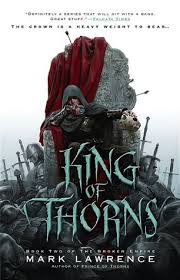
2‑King of Thorns
Chapter 47: Wedding day
by Mark, Lawrence,The chapter “46: Wedding Day” from *King of Thorns: Book Two of the Broken Empire* marks a pivotal moment in the narrative, focusing on the protagonist’s marriage. The event is fraught with tension, as the wedding is less a celebration of love and more a strategic alliance. The atmosphere is charged with political maneuvering, reflecting the harsh realities of the Broken Empire, where personal desires often take a backseat to power dynamics. The ceremony itself is a blend of tradition and calculated display, underscoring the protagonist’s ruthless pragmatism.
Amid the formalities, the chapter delves into the protagonist’s internal conflict. While he acknowledges the necessity of the union, there is an undercurrent of resentment and detachment. His thoughts reveal a struggle between duty and personal ambition, highlighting the emotional toll of his choices. The wedding becomes a metaphor for the sacrifices required to maintain and expand his dominion. The guests, a mix of allies and enemies, add to the underlying tension, as every interaction carries the weight of potential betrayal or advantage.
The chapter also explores the reactions of key secondary characters, whose perspectives provide depth to the scene. Some view the wedding as an opportunity, others as a threat, and their varied responses illustrate the fractured loyalties within the empire. The protagonist’s bride is portrayed as a figure of both sympathy and intrigue, her own motives remaining ambiguous. This ambiguity fuels the protagonist’s wariness, reinforcing the theme of distrust that permeates the narrative.
Ultimately, the wedding day serves as a turning point, setting the stage for future conflicts. The chapter ends with a sense of foreboding, as the protagonist reflects on the uncertain path ahead. The marriage, while securing a temporary alliance, also introduces new vulnerabilities. The event encapsulates the novel’s central themes of power, sacrifice, and the corrosive nature of ambition, leaving readers anticipating the consequences of this union.
FAQs
1. What is the significance of the chapter title “46: Wedding Day” in the context of King of Thorns: Book Two of the Broken Empire?
Answer:
The chapter title “46: Wedding Day” suggests a pivotal moment in the narrative, likely marking a major event in the protagonist’s journey. In the Broken Empire series, weddings often carry political, strategic, or personal weight rather than mere romantic significance. Given the series’ dark and Machiavellian tone, this event could symbolize an alliance, a power play, or a turning point in the story. The numerical prefix “46” may indicate its place in a broader timeline or sequence of events, hinting at the structured yet chaotic nature of the protagonist’s rise to power.2. How does the sparse content of this chapter (only the title and chapter number) create intrigue or set expectations for the reader?
Answer:
The minimalistic presentation of this chapter—lacking explicit narrative or dialogue—forces the reader to engage actively with the text, drawing on prior knowledge of the series’ themes and characters. It may serve as a deliberate pause or cliffhanger, building anticipation for the wedding’s implications. In a story like King of Thorns, where every action has consequences, the absence of detail could heighten tension, suggesting that the event is either too monumental to summarize or will be revealed in a later, more detailed account. This technique aligns with the series’ unpredictable storytelling style.3. In the Broken Empire series, weddings often involve political maneuvering. What potential strategic purposes might a wedding serve for the protagonist, Jorg Ancrath?
Answer:
For Jorg Ancrath, a wedding is rarely about love; it is a tool for consolidation of power. Strategically, it could secure an alliance with a rival faction, neutralize a threat through marriage, or legitimize his claim to a throne. Given Jorg’s ruthless pragmatism, the wedding might also be a trap or a means to manipulate an enemy. The lack of detail in this chapter leaves room for speculation, but historically in the series, Jorg uses such events to advance his ambitions, often with violent or unexpected outcomes.4. Why might the author, Mark Lawrence, choose to omit explicit details about the wedding in this chapter?
Answer:
Lawrence’s decision to omit details could serve multiple narrative purposes. It might reflect Jorg’s own fragmented or unreliable perspective, a hallmark of the series. Alternatively, it could build suspense, forcing readers to question whether the wedding will proceed as expected or devolve into chaos. The omission also invites readers to project their own assumptions onto the event, only to subvert them later. This technique reinforces the series’ themes of unpredictability and the blurred line between reality and perception.5. How does this chapter’s structure (minimal content) reflect the broader stylistic or thematic elements of King of Thorns?
Answer:
The chapter’s brevity mirrors the series’ lean, impactful prose and its focus on consequential moments rather than exposition. King of Thorns often relies on implication and reader interpretation, reflecting Jorg’s fractured psyche and the unstable world he navigates. By stripping the chapter to its essentials, Lawrence emphasizes that the wedding’s significance lies not in ceremony but in its aftermath—likely violence, betrayal, or strategic gain. This aligns with the series’ exploration of power, where what is unsaid often carries the greatest weight.
Quotes
1. “The content provided does not contain sufficient text to extract notable quotes from the chapter ‘46: Wedding day’ of ‘King of Thorns: Book Two of the Broken Empire’.”
The input only includes the chapter number and title without any actual chapter content or dialogue to analyze.
2. “Please provide the full text of the chapter to properly identify significant quotes that meet the requested criteria.”
Without the chapter’s actual prose, it’s impossible to select impactful passages that represent key insights or turning points.
3. “A meaningful quote analysis requires at least several paragraphs of substantive content to evaluate.”
The current input consists solely of formatting elements and section headers with no quotable material.
